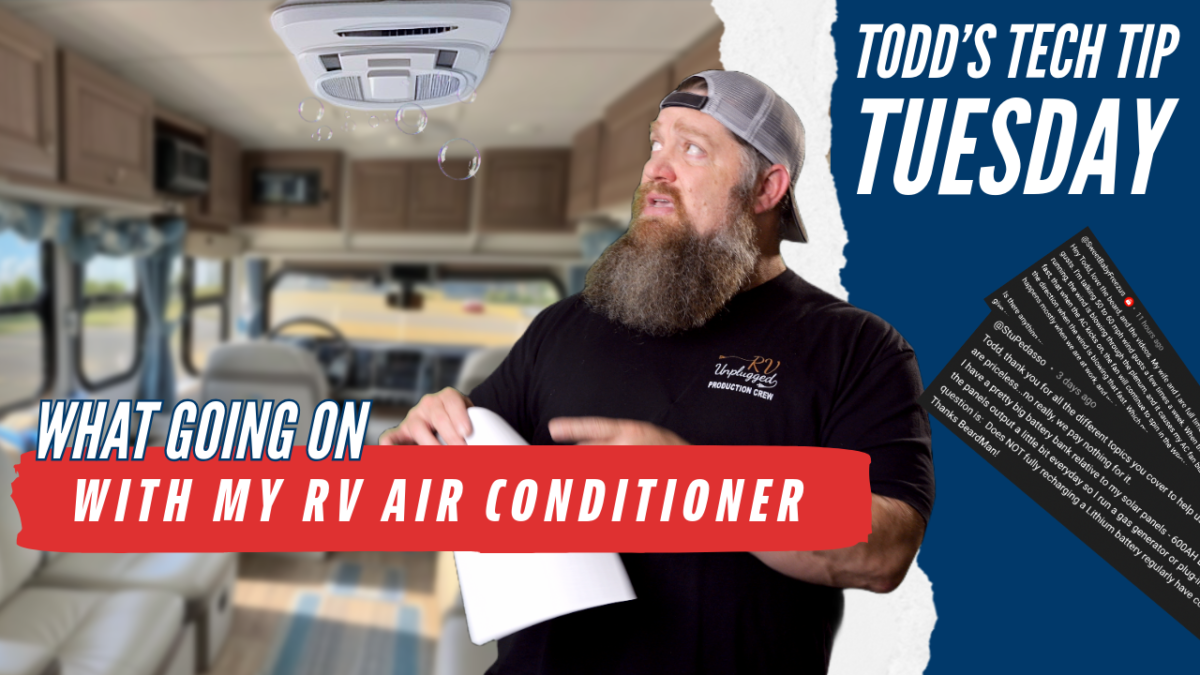Welcome to another installment of Todd’s Two-Minute Tech Tip Tuesday, brought to you by the National RV Training Academy, the largest hands-on RV training academy in America!
Dealing with High Winds and Your RV AC
Today, we’re addressing a unique challenge presented by a viewer with the coolest name ever: Sweet Baby Freezes. Sweet Baby Freezes is a full-time RVer experiencing frequent high wind gusts of 50 to 60 miles per hour. These gusts are causing the AC fan blades to spin in the opposite direction, which in turn prevents the AC from pulling air through the evaporator, leading to freezing issues. This problem becomes particularly concerning when they’re away at work, leaving their pets in an overheated RV.
Understanding the Problem
The issue arises because high winds are causing the fan blades to spin backward, and when the AC kicks on, the fan continues to spin in the wrong direction due to the momentum. This prevents the AC from functioning correctly, leading to a lack of cooling and causing the evaporator coils to freeze.
Potential Solutions
- Air Dam Installation: The primary solution is to create an air dam around the air conditioner unit to block the wind. This could be constructed from sturdy materials like plywood or even lightweight kite material. The key is to design something heavy enough to withstand strong winds without getting blown away but light enough to handle easily. Consider using foam pool noodles at the base to prevent scratching the RV.
- Directional Adjustment: Another option is to reorient the RV so that the wind blows with the fan blades, aiding their correct rotation rather than opposing them.
- Capacitor Check: Ensure the capacitor is functioning correctly, as it provides the necessary kick to get the fan moving in the right direction. If the capacitor isn’t providing the right microfarads, it could exacerbate the problem.
Additional Thoughts
These solutions aim to block or redirect the wind to prevent the fan from spinning in the wrong direction. However, each situation is unique, and modifications may be necessary based on your specific RV setup. If you have any additional suggestions or successful implementations, please share them in the comments!
Lithium Battery Maintenance
Our second question comes from Stu P. Passo, who has a 600 amp-hour battery bank paired with 800 watts of solar panels. He wants to know if not fully recharging the lithium batteries regularly has consequences, such as shortening their lifespan or reducing total output.
Battery Balancing
Lithium batteries, especially lithium iron phosphate (LiFePO4), contain multiple cells that need to remain balanced. Manufacturers try to match these cells closely to ensure even charging and discharging. However, if the cells are not balanced correctly, you may not get the full capacity from your batteries.
Top Charging
To maintain balance, it’s essential to perform a top charge regularly. This involves fully charging the batteries every few days to ensure all cells are balanced. For a 600 amp-hour bank, aim for three hours of top charge every seven days, whether through solar power, a generator, or shore power.
Long-term Effects
Not balancing the cells regularly can lead to reduced capacity over time. For instance, you might only get 500 amp-hours from a 600 amp-hour bank if the cells remain out of balance. Therefore, it’s crucial to incorporate regular top charging into your maintenance routine to ensure the longevity and efficiency of your battery bank.
Conclusion
Addressing high wind challenges with your RV AC and maintaining your lithium battery bank are crucial for ensuring a comfortable and efficient RV living experience. For those interested in learning more about RV maintenance and repair, consider joining us at the National RV Training Academy. We offer comprehensive courses to help you become proficient in RV maintenance and repair.
Thank you for tuning in to this week’s Tech Tip Tuesday. Now, let’s roll the bloopers!
For those watching and thinking, “That was a lot of technical stuff!” – if you have questions, join us at the NRVTA. You’ll have the chance to ask those off-the-wall questions and get expert answers. Until next time, happy RVing!

